Related Research Articles
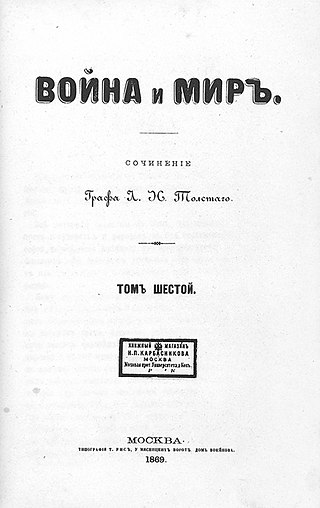
War and Peace is a literary work by the Russian author Leo Tolstoy that mixes fictional narrative with chapters on history and philosophy. It was first published serially, then published in its entirety in 1869. It is regarded as Tolstoy's finest literary achievement and remains an internationally praised classic of world literature.
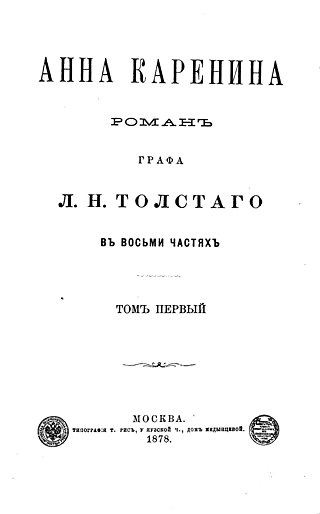
Anna Karenina is a novel by the Russian author Leo Tolstoy, first published in book form in 1878. Widely considered to be one of the greatest works of literature ever written, Tolstoy himself called it his first true novel. It was initially released in serial installments from 1875 to 1877, all but the last part appearing in the periodical The Russian Messenger.

The Tragical History of the Life and Death of Doctor Faustus, commonly referred to simply as Doctor Faustus, is an Elizabethan tragedy by Christopher Marlowe, based on German stories about the title character Faust. It was probably written in 1592 or 1593, shortly before Marlowe's death. Two different versions of the play were published in the Jacobean era several years later.
What Is Art? is a book by Leo Tolstoy. It was completed in Russian in 1897 but first published in English due to difficulties with the Russian censors.

Count Aleksey Konstantinovich Tolstoy, often referred to as A. K. Tolstoy, was a Russian poet, novelist, and playwright. He is considered to be the most important nineteenth-century Russian historical dramatist, primarily on account of the strength of his dramatic trilogy The Death of Ivan the Terrible (1866), Tsar Fyodor Ioannovich (1868), and Tsar Boris (1870). He also gained fame for his satirical works, published under his own name and under the collaborational pen name of Kozma Prutkov. His fictional works include the novella The Family of the Vourdalak, The Vampire (1841), and the historical novel Prince Serebrenni (1862).

The Kreutzer Sonata is a novella by Leo Tolstoy, named after Beethoven's Kreutzer Sonata. The novella was published in 1889, and was promptly censored by the Russian authorities. The work is an argument for the ideal of sexual abstinence and an in-depth first-person description of jealous rage. The main character, Pozdnyshev, relates the events leading up to his killing of his wife: in his analysis, the root causes for the deed were the "animal excesses" and "swinish connection" governing the relation between the sexes.
A Confession, or My Confession, is a short work on the subject of melancholia, philosophy and religion by the Russian novelist Leo Tolstoy. It was written in 1879 to 1880, when Tolstoy was in his early fifties.
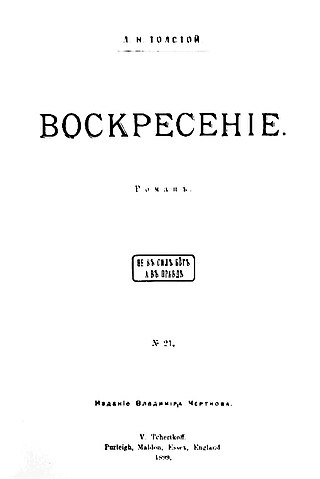
Resurrection, first published in 1899, was the last novel written by Leo Tolstoy. The book is the last of his major long fiction works published in his lifetime. Tolstoy intended the novel as a panoramic view of Russia at the end of the 19th century from the highest to the lowest levels of society and an exposition of the injustice of man-made laws and the hypocrisy of the institutionalized church. The novel also explores the economic philosophy of Georgism, of which Tolstoy had become a very strong advocate towards the end of his life, and explains the theory in detail. The publication of Resurrection led to Tolstoy's excommunication by the Holy Synod from the Russian Orthodox Church in 1901.
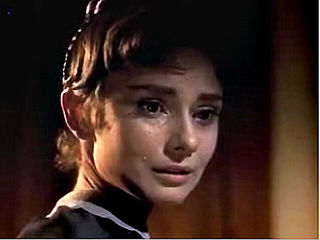
Countess Natalya "Natasha" Ilyinichna Rostova is a central fictional character in Leo Tolstoy's 1869 novel War and Peace. She is the daughter of Ilya Rostov, a loving, kind, and generous nobleman. Natasha is based on both Tanya Behrs, Tolstoy's sister-in-law, and Sophia Tolstaya, Tolstoy's wife.

Family Happiness is an 1859 novella written by Leo Tolstoy, first published in The Russian Messenger.

Aylmer Maude and Louise Maude (1855–1939) were English translators of Leo Tolstoy's works, and Aylmer Maude also wrote his friend Tolstoy's biography, The Life of Tolstoy. After living many years in Russia the Maudes spent the rest of their life in England translating Tolstoy's writing and promoting public interest in his work. Aylmer Maude was also involved in a number of early 20th century progressive and idealistic causes.
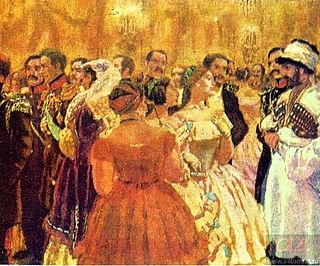
Hadji Murat is a novella written by Leo Tolstoy from 1896 to 1904 and published posthumously in 1912. It titular protagonist Hadji Murat is an Avar rebel commander who, for reasons of personal revenge, forges an uneasy alliance with the Russians he has been fighting.
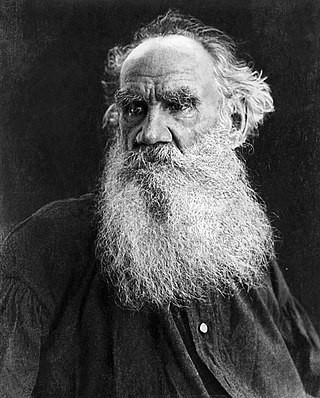
This is a list of works by Russian writer Leo Tolstoy (1828–1910), including his novels, novellas, short stories, fables and parables, plays, and nonfiction.

Count Lev Nikolayevich Tolstoy, usually referred to in English as Leo Tolstoy, was a Russian writer who is regarded as one of the greatest authors of all time. He received nominations for the Nobel Prize in Literature every year from 1902 to 1906 and for the Nobel Peace Prize in 1901, 1902, and 1909; the fact that he never won is a major controversy.
"The Two Brothers and the Gold" is a short story by Leo Tolstoy written in 1885.
"Evil Allures, But Good Endures" is a short story by Leo Tolstoy written in 1885. It is commonly included in the massively-reproduced collection Twenty-three Tales.
"Two Hussars" is a novella by Leo Tolstoy published in 1856, and translated into English by Nathan Haskell Dole. This is a novel in which one generation struggles against an earlier generation, or Tolstoy's generation is in struggle against that of his fathers. Tolstoy translator Aylmer Maude describes the text as a "a rollicking tale with flashes of humor resembling Charles Lever's." Russian and Soviet literary scholar Boris Eikhenbaum has suggested that the introduction to Two Hussars was actually intended to be in The Decembrists, the incomplete novel that was supposed to be the following installment of War and Peace.
"A Dialogue Among Clever People" is a short story by Leo Tolstoy published in 1892. Aylmer Maude was one of the first translators.
"The Young Tsar" ("Нечаянно") is a short story by Leo Tolstoy written in 1894. According to Tolstoy's diary, he recalled having titled it "The Dream of a Young Tsar". The introduction that prefaces the story is by Aylmer Maude.
Twenty-Three Tales is a popular compilation of short stories by Leo Tolstoy. According to its publisher, Oxford University Press, the collection is about contemporary classes in Russia during Tolstoy's time, written in a brief, morality-tale style. It was translated into English by Louise Maude and Aylmer Maude.
References
- ↑ Leo Tolstoy (2004). The Man Who Was Dead and the Cause of It All: Two Plays by Leo N. Tolstoy. University Press of the Pacific.
Of the three plays left by Tolstoy for publication after his death, one is a short two-act Temperance play called in English The Cause of it All
- ↑ Barrett Harper Clark (1925). A Study of the Modern Drama: A Handbook for the Study and Appreciation of the Best Plays, European, English and American, of the Last Half Century. D. Appleton.
- ↑ Leo Tolstoy (2013). Leo Tolstoy's The Cause of it All. Copyright Group.